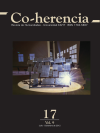Job and the tragic theology of Paul Ricoeur
Main Article Content
Keywords
Conduct (Ethics), Religious ethics, Belief and doubt, Faith, Bible. -A. T. -Job - Criticism, interpretation, etc.
Abstract
Job shatters the ethic vision of the world. In order to achieve this it is needed that everything is just such that the problem is established with all its sharpness and makes possible to appear the question: How is it possible for a just man to suffer in such an absurd manner? To Ricoeur, what Job discovers is the tragic God. In this way, beyond any ethic vision, Job enters a new faith dimension, the faith in front of what is unjustifiable and unverifieble. With his non-science, Job is the only one “to have spoken well about God.” His tragic theology does not try to explain the reason behind suffering and tries to limit the pretentious of any rational theology in explaining God. The author coincides with Ricoeur in criticizing the unilateral conception of a moral God who emphasizes an ethical, penal and juridical vision of the life, but he does not believe that any notion of remuneration, justice and a sorrow could be excluded by them. He thinks that Job’s book is not a tragedy and criticizes both Ricoeur’s vehement rejection of the notion of original sin and the disqualification of any theodicy.
Downloads
Download data is not yet available.
References
Albertos, J.E. (1991). El mal en la filosofía de la voluntad de Paul Ricoeur, ed. Eunsa, 2008.
Auerbach, E. (1950). Mimesis: La representación de la realidad en la literatura occidental. México: Fondo de Cultura Económica.
Greisch, J. – Kearney, R. (1988). Paul Ricoeur, les metamorphoses de la raison hermenéutique. París: ed. Cerf.
Hereu I Bohigas J. (1993). El mal com a problema filosòfic: estudi del problema del mal en la filosofia de Jean Nabert y Paul Ricoeur. Barcelona: Herder.
Kane, G. S. (1975). “The Concept of Divine Goodnes and the Problem of Evil”. En: Religious Studies, 11, pp. 49-71.
Keith, B. (1997). “Indignation Toward Evil, Ricoeur and Caputo on a Theodicy of protest”. En: Philosophy Today, 41, pp. 446-459.
Maceiras, M. – Trebolle, J. (1985). La hermenéutica contemporánea. Madrid: Cincel.
Mongin, O. (1994). Paul Ricoeur. París: ed. Seuil.
Peña Vial, J. (2009). El mal para Paul Ricoeur. Pamplona: Cuadernos de Anuario Filosófico.
Ricoeur, P. (1960). Philosophie de la volonté II Finitude et culpabilité, com-prende L’homme faillible y La symbolique du mal, Paris: Aubier. Ambos están recogidos en un solo volumen, Finitud y culpabilidad (2004), Madrid: Trotta.
Ricoeur, P. (1969). “Interpretación del mito de la pena”. En: Le conflit des interprétations, Paris: Seuil, 1969; trad. al cast. de Alejandrina Falcón, El conflicto de las interpretaciones (2003), Buenos Aires: Fondo de Cultura Económica.
Ricoeur, P. (2003). “Religión, ateísmo, fe”. En: El conflicto de las interpretaciones, Buenos Aires: Fondo de Cultura Económica.
Schökel, L. A. – Sicre Diaz, J. L. (2002). Job. Comentario teológico y litera-rio, Madrid: Cristiandad.
Stedwart, D. (1969). “Ricoeur’s Phenomenology of Evil”. En: International Philosophical Quartely, 9, pp. 572-589.
Auerbach, E. (1950). Mimesis: La representación de la realidad en la literatura occidental. México: Fondo de Cultura Económica.
Greisch, J. – Kearney, R. (1988). Paul Ricoeur, les metamorphoses de la raison hermenéutique. París: ed. Cerf.
Hereu I Bohigas J. (1993). El mal com a problema filosòfic: estudi del problema del mal en la filosofia de Jean Nabert y Paul Ricoeur. Barcelona: Herder.
Kane, G. S. (1975). “The Concept of Divine Goodnes and the Problem of Evil”. En: Religious Studies, 11, pp. 49-71.
Keith, B. (1997). “Indignation Toward Evil, Ricoeur and Caputo on a Theodicy of protest”. En: Philosophy Today, 41, pp. 446-459.
Maceiras, M. – Trebolle, J. (1985). La hermenéutica contemporánea. Madrid: Cincel.
Mongin, O. (1994). Paul Ricoeur. París: ed. Seuil.
Peña Vial, J. (2009). El mal para Paul Ricoeur. Pamplona: Cuadernos de Anuario Filosófico.
Ricoeur, P. (1960). Philosophie de la volonté II Finitude et culpabilité, com-prende L’homme faillible y La symbolique du mal, Paris: Aubier. Ambos están recogidos en un solo volumen, Finitud y culpabilidad (2004), Madrid: Trotta.
Ricoeur, P. (1969). “Interpretación del mito de la pena”. En: Le conflit des interprétations, Paris: Seuil, 1969; trad. al cast. de Alejandrina Falcón, El conflicto de las interpretaciones (2003), Buenos Aires: Fondo de Cultura Económica.
Ricoeur, P. (2003). “Religión, ateísmo, fe”. En: El conflicto de las interpretaciones, Buenos Aires: Fondo de Cultura Económica.
Schökel, L. A. – Sicre Diaz, J. L. (2002). Job. Comentario teológico y litera-rio, Madrid: Cristiandad.
Stedwart, D. (1969). “Ricoeur’s Phenomenology of Evil”. En: International Philosophical Quartely, 9, pp. 572-589.




